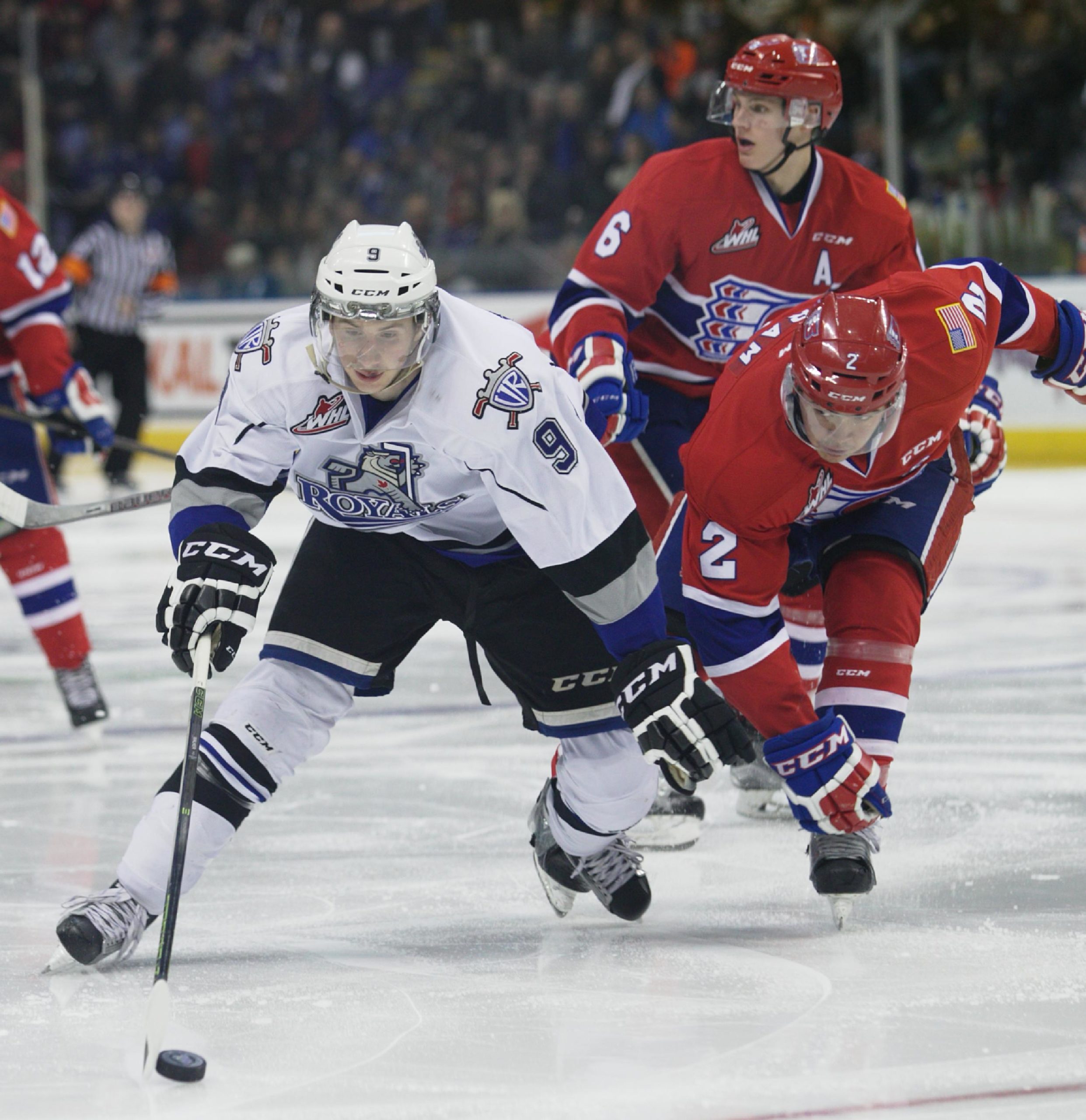On the heels of the 2016 NHL Draft, I caught up with head coach of the Victoria Royals, Dave Lowry, to discuss new Toronto Maple Leafs prospects Vladimir Bobylev and Jack Walker.
Was it a pleasant surprise seeing four of your guys picked up by NHL teams yesterday? It’s such an interesting group of players, with the overage element and then Matthew Phillips – 5’7, under 140 pounds — being the smallest player in the draft class.
Dave Lowry: Every year you go in and hope you’re going to have certain individuals get drafted. We didn’t want have our expectations too high, but we went in with a lot of hope this year. We were fortunate that a couple of guys who have gone through the draft and were eligible and didn’t get drafted came back and had very good years. With Matthew Phillips, given his size, he was also going to be a question mark. For our franchise moving forward, there were a lot of positives. It was a real good day.
What do you think of this overall trend of overagers that seemed to take place throughout the league yesterday? Do you think teams are smart to try to find inefficiencies there?
Lowry: I think the big thing is it lends credibility to the idea that some guys are later developing. Case in point is my two guys. They had great years. By anybody’s standards, they were very good players. They were very consistent players. They created excitement in our room. We were able to really benefit and gain momentum from them.
Can you give us a sense of Jack Walker and Vladimir Bobylev’s games – what they do well and what they need to work on still?
Lowry: As with all players, Bobylev is going to have to continue to develop the consistency in his game. He’s a big-bodied guy. He skates well. He does have deceptive speed. He can play a heavy game. At one point in the year, he was also leading our team in fighting majors. He can play a big man’s game. He just needs to make sure that he continues to understand that you have to do it every day.
Jack is a converted defenceman that I moved up a couple of years ago. We felt that, if he was going to have any aspirations or get any opportunities, he was going to have to do it as a forward. He’s a very dynamic, very quick-skating forward. He does have a little bit of an edge to his game. He does go to areas to compete. In our league right now, he’s probably the fastest skating player with the puck. He does have some deception in his game as well.
When did Jack actually convert from defence to forward? What did your staff see in him that led you to believe that he could be successful up front?
Lowry: The one reason why, at first, we moved him was because we had three 16-year-old defencemen. It was a way to make sure that he would get into the lineup on most nights. He was good with it for a short period of time, but I really believed in his heart that he still wanted to be a defenceman. We put him back on D, and then we got into a situation where we had injuries up front. I had asked him if he would move back up. I said I would let him go back to playing the position that he really wanted, which was defence, and when we got healthy we’d move him back. I later explained to him that I had lied to him and that I felt he would be – if he wanted to go back and play D on our team – a five, six or a seven and may not be in our lineup every night. It was that or he could go up to forward, where he would play in the top six and play on the powerplay. Any smart guy, that’s what they want. As soon as we made that decision, everything was forward. That was where he was going to play. He really elevated his game.
So that initial conversion happened half way through his 16-year-old season?
Lowry: Yeah. Like I said, we had three 16-year-old defencemen. I couldn’t play them all on defence at the same time. Jack was probably the one guy that had the versatility in his game that allowed us to try that experiment. It was a way for him to come into our league and really get his feet wet in his first year.
I heard that the Minnesota Wild invited him to camp last year. I imagine that cemented for him that being at forward is the right place to be.
Lowry: Jack is a guy that will surprise a lot of people. With a lot of these guys, too, there is a trust factor. They have certain ideas themselves. Sometimes they might not always be in agreement early on with coaches and decisions that are made. But as soon as they have an understanding and you gain their trust in everything, they understand that everything you’re doing is for their benefit. Usually it settles things down. With Jack, he really trusted that this was going to give him the best opportunity to be a pro hockey player. He took it and ran with it.
The one reason why we moved him to forward is he’s always been a very good defender, but he always had the puck. When you start playing with higher-end players, and you start having to defend in your own zone, you can’t always have the puck. His strength, I felt, was his skating and his explosiveness and how quick he can turn on pucks. We just felt that, if he was going to have a shot at the NHL, it was going to be as a forward. Not everybody is receptive to it, but once he saw the benefit of it… I don’t think he regrets his decision.
Having that defensive background, does that kind of inform his defensive game as a forward? How is he in that aspect of that game, as a forward defensively?
Lowry: He’s responsible. That’s something that we instil in all of our players. Regardless of your skill, you still have to play on the right side of the puck and you have to know how to play the game when you don’t have the puck. That’s something that we talk about regularly. All that is trying to do is to prepare them to play at the next level.
The two Leaf picks played on a line together with Tyler Soy, picked up by Anaheim in the seventh round yesterday. When did you find that combination and why did that line have such a good year together?
Lowry: We put that line together towards the second half. The reason for that is that Bobylev was a centerman. He is a guy that can play both center and wing. He wanted to be a centerman. That’s where he felt his biggest strengths were. Once again, with the way our team was built and the way that our team was set up, Bobylev got to play center for the first half of the year. He might not have liked the opportunity that he was getting, but he told me that that’s where he wanted to play. With our team, he was going to jump around between a third line center and a fourth line center. Once again, you have discussions with players, and you talk about positions that are not only best suited for your team, but for the individual. You have an opportunity to play with some veteran players. You have the opportunity to play in the top six. You have the opportunity to get on the first powerplay unit with these guys that are highly-skilled players. Smart guys take those opportunities. That’s what Bobylev did. He played on the right wing.
Do you think that Bobylev is a player who could potentially be versatile at the pro level between playing center and wing? How does his game compare at the two positions?
Lowry: I liked his game at center. Everybody knows that I look at the Western Conference. I know Toronto is not in that conference, but they all have big centermen. The teams that win all have big centermen. I am going to continue to float him back and forth. I think it’s important, for his development and his role as a player, to be able to play both positions. We all know center is a hard position to play. Everybody can play wing. He was a very good centerman for us, but we were a better team if he was playing wing for us.
Bobylev is a guy who re-entered the draft, where Victoria picked him up. What did you guys see in him that suggested he had a lot more to give than what he showed in Vancouver?
Lowry: It’s all about experience. For Bobylev, he didn’t have a great experience. He scored three goals, but the one thing we liked about him is we knew we were going to be an undersized team. We liked the fact that he was a big-bodied guy and that he had one-year experience in the league. We knew what we were getting, as opposed to just drafting players unseen and just going on scouting reports. We felt comfortable. That’s a credit to [Royals General Manager] Cam Hope. He decided, through conversations with his agent, that he would be a very good player for us. Really, for us, there was no risk involved.
I saw a video of him fighting Andrew Nielsen, the Leafs prospect, who is not exactly a small guy. I take it Bobylev doesn’t back down from anyone.
Lowry: I’ll tell you what – Bobylev, in actual fact, is one of my toughest players. He led our team in fighting majors for most of the year. I don’t know if he finished with the most, but he’s not afraid to play a physical game.
As you were talking I popped his name into YouTube and there is a tonne of fight clips. Does he walk the line well? You do like a guy who has that edge and is willing to stand up for himself and his teammates, but you don’t want him stepping over it into undisciplined territory and hurting his team.
Lowry: I like a guy who can play the game. In Victoria, we don’t encourage the fighting, but we all know that it is part of the game sometimes. Bobylev understands when is a good time to fight. Every time he fought there was a reason behind it. He’s not one of those guys who taps guys’ shinpads and says let’s fight. His fights are usually the result of a play that has impacted the game.
Before I let you go, I was watching a Shaw TV profile of Jack Walker and he seemed to have a warm, likeable personality. Can you give us a sense of what he’s like as a person off the ice?
Lowry: He’s a great kid. He’s going to sit back and he’s going to probably be a bit of a spectator at first, but when he gets comfortable in his environment he’s a character.
And Bobylev? How has his adjustment been over here in North America?
Lowry: Great. He’s got a very good handle on the language. Usually when you’re mad at him, he tells you he doesn’t understand you, but we all know he speaks very good English. He’s a very intelligent kid as well.

































